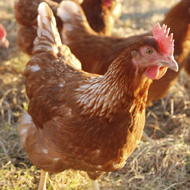Funding to improve poultry vaccines

Chicken is the UK's most consumed meat.
Over five million pounds of funding has been granted to the Roslin Institute to design and improve vaccines for poultry.
Granted by the BBSRC, the £5.7m will be used to develop strategies to reduce infections in farmed animals, control food-borne diseases and minimise antibiotic use in the food chain.
The award is one of three recently funded grants thorough BBSRC's Strategic Longer and larger (sLoLa) scheme, which gives world-leading research teams five years of funding and resources to address major challenges.
Professor Mark Stevens, director of research at The Roslin Institute said: “We are delighted to partner with BBSRC and leading laboratories to tackle important poultry and foodborne diseases. Taken together with BBSRC strategic investment in the National Avian Research Facility here at The Roslin Institute the project will greatly help us to address the global challenge of improving food supply and safety.”
Chicken is the UK's most consumed meat and the most popular animal-based food in the world. However, poultry are key reservoirs of food borne pathogens such as Salmonella and Campylobactor and their productivity and welfare are constrained be endemic diseases caused by E.coli and clostridia.
The Roslin Institute say that this project aims to develop and refine vaccine to protect poultry flocks against Salmonella, Campylobacter, E. coli and Clostridium infection.
The grant will also enable research to develop glycoengineering technology to produce a new generation of inexpensive veterinary vaccines.
The principal investigator of the project Brendan Wren, Professor of Microbial Pathogenesis at the London School of Hygiene & Tropical Medicine, said: "Developing effective, inexpensive vaccines for livestock has multiple advantages, not just in protecting animals from disease, but also in reducing infections in humans and antibiotics in the food chain that are often used in rearing livestock. “



 The latest
The latest